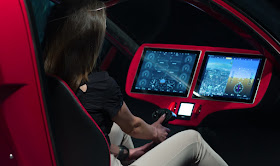https://youtu.be/IStmyk3R3Hc
https://youtu.be/V3pi4HfQ0Gc
September 29, 2017 – Passenger Drone, is proud to announce the launch of the world’s most advanced, state-of-the-art, autonomous manned aerial vehicle.
Slightly larger than a small car, the industry leading, Passenger Drone has the potential to change the traditional means of commuter transportation. Utilizing its easy to use touch-screen, passengers simply select their destination, sit back and relax, as the drone takes over, eliminating stressful commutes with the ability to travel up to 80 km/h.
The aircraft commenced flight testing in early May 2017 and for the last few months has performed intensive testing with different simulated payload weights, simulated engine failures and different control modes. In August 2017 first manned flights with passengers onboard took place and the results and passenger feedback is overwhelming – the Passenger Drone is very easy to fly in both manual and autonomous modes and it shows amazing stability and maneuverability.
Equipped with 16 electric engines (unlike the internal combustion engines of traditional helicopters), it’s a low noise, high speed, and economical mean of transportation which emits zero emissions. Its engine system sheds the complexity of most quad-copters providing enhanced safety, performance, greater payload and range, and less noise than anything else available on the marketplace.
The vehicle’s structure is composed of lightweight and strong carbon fiber composites, specially created for Passenger Drone. The avionics, stability systems and electrical control systems have been custom designed specially for the PassengerDrone.
Potential for change
The social and economic benefits of such a vehicle are numerous. In cities around the world, traffic congestion costs commuters millions of hours every year and billions of dollars in lost productivity. The average travel time to work in the United States is 25.4 minutes, representing almost an hour every day, and just under two weeks annually. In 2016, the total cost of congestion to all drivers in the U.S. was $300 billion (including environmental costs), and that total is expected to rise by 50 percent over the next fifteen years. In many global megacities, the situation is far worse.
Leading Innovation
Passenger Drone’s industry advantages include its VTOL capabilities, the redundancy of 16 individual motors, quadruple redundant stability system as well as state of the art custom designed avionics with leading aviation industry features. Over time, VTOLs have the potential to become the go-to form of daily transportation surpassing that of owning a car. Air travel has historically been seen as an expensive proposition, due in great part to the small volume of production seen in today’s aerospace industry. Mass production of the Passenger Drone could potentially revolutionize traditional notions of transport.
Lightweight, Safe and Reliable
Passenger Drone is run strictly on FIBRE OPTICS. With the exception of the main power cables, there is not a single wire in the entire aircraft. From the connection between the control joystick, main control CPU, engine controllers and the navigation screens, everything is communicated by LIGHT.
First in it’s class for safety, reliability, and security the drone should be practically foolproof. The 16 individual rotors are all powered separately ensuring stability, cohesion, and redundancy.
Market Segment
With the launch of PassengerDrone and few other similar projects in 2017 there is a completely new market segment forming in aviation market – the electric VTOL ( Vertical Takeoff and Landing) Manned Aerial Vehichles . We are proud to join the MAV club alongside some of the largest companies in the world (Uber, Airbus, Google, Daimler and many others) who are working in the same direction.




No hay comentarios:
Publicar un comentario